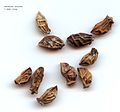Anchusa azurea is a species of flowering plant in the family Boraginaceae, known by the common names garden anchusa[1] and Italian bugloss (or just "bugloss"). This bristly herbaceous perennial may reach 1.5 m (4.9 ft) tall and 60 cm (24 in) wide.[2] It has straight lance-shaped leaves and petite tubular flowers about 15 millimeters across with five bright violet-blue petals.[3] These flowers, which typically appear in May–July, are edible and attract bees.[4] This species is native to Europe, western Asia, and eastern Maghreb.[5]
| Anchusa azurea | |
|---|---|

| |
| Scientific classification | |
| Kingdom: | Plantae |
| Clade: | Tracheophytes |
| Clade: | Angiosperms |
| Clade: | Eudicots |
| Clade: | Asterids |
| Order: | Boraginales |
| Family: | Boraginaceae |
| Genus: | Anchusa |
| Species: | A. azurea
|
| Binomial name | |
| Anchusa azurea | |
| Synonyms | |
|
Anchusa italica | |
The genus name Anchusa comes from the Greek 'ankousa', which is the name of a root pigment once used for cosmetic purposes.[6]
Numerous cultivars have been developed for garden use, including 'Dropmore', 'Feltham Pride', 'Little John', 'Loddon Royalist' and 'Opal'.[7]
In the US it is suitable for hardiness zones 3–8. It grows best in full sun with good drainage, and is drought tolerant once established.[7] It may be susceptible to leafminer and powdery mildew.[8]
References
edit- ^ BSBI List 2007 (xls). Botanical Society of Britain and Ireland. Archived from the original (xls) on 2015-06-26. Retrieved 2014-10-17.
- ^ "Anchusa azurea 'Loddon Royalist'". BBC Gardeners' World Magazine. Retrieved 2021-04-28.
- ^ "Buy Anchusa azurea Loddon Royalist AGM | Perennials". Burford Garden Company. Retrieved 2021-04-28.
- ^ "Anchusa azurea Loddon Royalist'". Sarah Raven. Retrieved 2021-04-28.
- ^ The Euro+Med PlantBase - the information resource for Euro-Mediterranean plant diversity.Details for:Anchusa azurea. Accessed on 10 March 2012.
- ^ "How to Grow Anchusa (Anchusa Azurea, Dropmore Flower, Italian Bugloss)". Gardening Channel. 2019-03-27. Retrieved 2021-04-28.
- ^ a b "Anchusa azurea (Italian Bugloss)". Gardenia.net. Retrieved 2021-04-28.
- ^ "Anchusa (Bugloss)". www.seasonalgardening.co.uk. Retrieved 2021-04-28.
External links
edit

